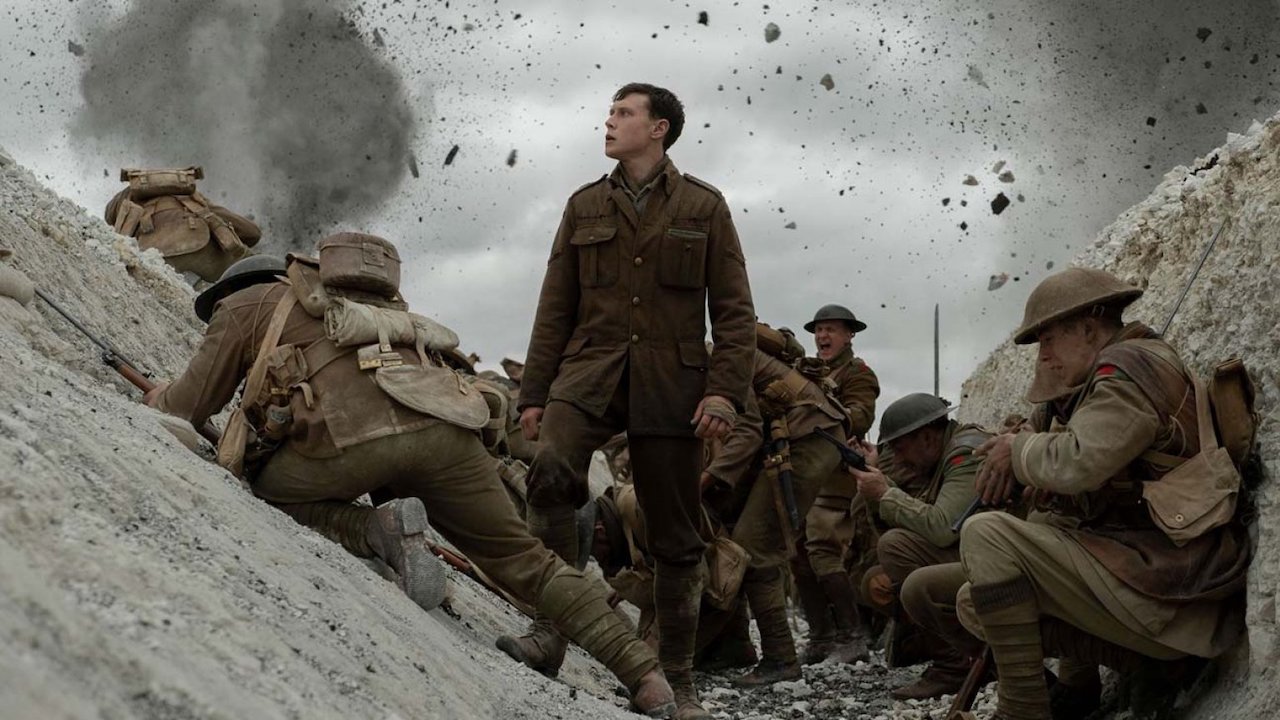GamesRadar+ Verdict
Sam Mendes audacious WW1 epic is a sensational technical achievement, grounded by George MacKay’s gritty intensity.
Why you can trust GamesRadar+
Many films have dabbled with the fake single take. A couple – most notably Russian Ark (2002) and Victoria (2015) – have even done it for real. But none have attempted it on quite the scale of Sam Mendes’ World War I movie, 1917, which combines the production values and pyrotechnics of a huge studio picture with the real-time unspooling of a play.
Taking place on 6 April 1917, the film zeroes in on two British soldiers: Private Blake (Game Of Thrones’ Dean-Charles Chapman) and Private Schofield (George MacKay). They’re stationed in Northern France, and charged with getting a pivotal message to another company that’s set to march straight into a German ambush. Blake’s brother is with the regiment, giving him a personal impetus to embark on the life-and-death mission across no man’s land and beyond. Blake’s brother is one of 1,600 lives the boys could potentially save if they deliver the message on time, but the clock’s ticking…
And so the stage is set for a story that benefits Mendes’ unique approach, preventing it feeling like a gimmick; it’s hard to imagine this particular story told any other way. It’s a staggering technical achievement, one that will see Roger Deakins retaining his unofficial Greatest Living Cinematographer crown. Some of the shots that he’s composed would be remarkable if achieved outside of the ‘long-take’ conceit; the fact that they’re woven into such a restrictive framework beggars belief. Some moments wow on a technical, effects-based level: crashing planes, coursing rapids, incoming enemy shelling. Others for their sheer aesthetic beauty, like nighttime ruins illuminated by flares.
The effect of the single-shot conceit proves most impactful when there are sudden bursts of violence, the immersion increasing the visceral terror. Lee Smith’s measured editing, in conjunction with Thomas Newman’s pulse-pounding score, makes for a very tense viewing experience. MacKay’s dogged intensity ensures you’re always invested in the mission; given very little in the way of backstory, he can represent any soldier’s grit, determination, fear, hope.
1917’s visual showmanship isn’t entirely without drawbacks. As artfully stitched together as it is, and impressive as some of the unbroken takes are individually, it’s difficult to avoid marvelling at the effect and wondering how they achieved it, when you should be swept up in the story. It also highlights shortcomings in the script, written by Mendes (inspired by stories his grandfather told) and Krysty Wilson-Cairns. Dean-Charles Chapman is likeable enough, but doesn’t do the script’s occasional staginess any favours.
Another distraction comes via the string of A-list Brit cameos that the boys encounter along the way. Initially, they work well. Colin Firth has the requisite gravitas required to convince as their superior, and outlines the mission and its implications with appropriate weight. Andrew Scott is also superb as as a cynical lieutenant who points the boys in the right direction early on. But as the film goes on, the famous faces undermine the verisimilitude achieved elsewhere, as you start to anticipate the next one. Thankfully, the final star name delivers some genuinely earned emotion.
1917 reaches US theatres on 25 December and UK cinemas on 10 January 2020.

I'm the Editor at Total Film magazine, overseeing the running of the mag, and generally obsessing over all things Nolan, Kubrick and Pixar. Over the past decade I've worked in various roles for TF online and in print, including at GamesRadar+, and you can often hear me nattering on the Inside Total Film podcast. Bucket-list-ticking career highlights have included reporting from the set of Tenet and Avengers: Infinity War, as well as covering Comic-Con, TIFF and the Sundance Film Festival.



